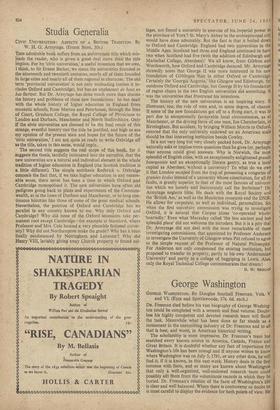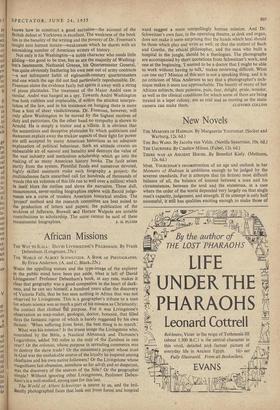George Washington
GEORGE WASHINGTON. By Douglas Southall Freeman. Vols. V and VI. (Eyre and Spottiswoode, 37s. 6d. each.) DR. Freeman died before his vast biography of George Washing- ton could be completed with a seventh and final volume. Doubt- less his highly competent and devoted research team will finish the task. Meanwhile what has been done so far stands as a monument to the unremitting industry of Dr. Freeman and to all that is best, and worst, in American historical writing.
The scholarship is most impressive. Dr. Freeman's team has searched every known source in America, Canada, France and Great Britain. It is doubtful whether any fact of importance for Washington's life has been misse,d and if anyone wishes to knoW where Washington was on July 3, 1791, or any other date, he will find it, if it is known, in this vast work. History deals in the first instance with facts, and so many are known about Washington that only a well-organised, well-endowed research team could possibly sift them from the voluminous records in which they lie buried. Dr. Freeman's relation of the facts of Washington's life is clear and well balanced. Where there is controversy or doubt he is most careful to display the evidence for both points of view. He knows how to construct a good narrative—the account of the British defeat at Yorktown is excellent. The weakness of the book lies in the banality of the writing and the poverty of Dr. Freeman's insight into human nature—weaknesses which he shares with an astonishing number of American writers of history.
Not only is his Washington—a noble character who needs little gilding--too good to be true, but so are the majority of Washing- ton's lieutenants. Nathaniel Greene, his Quartermaster General, was quite obviously feathering his own nest out of army contracts —a not infrequent habit of eighteenth-century quartermasters and one which the age did not find particularly reprehensible. Dr. Freeman states the evidence fairly but spirits it away with a string of pious platitudes. The treatment of the Major Andre case is similar. Andre was hanged as a spy. Towards Andre Washington was both ruthless and implacable, if within the strictest interpre- tation of the law, and in his insistence on hanging there is more than a hint of sheer vindictiveness. Dr. Freeman, however, will only allow Washington to be moved by the highest motives of duty and patriotism. On the other hand no sympathy is shown to Arnold. He is simply a traitor and a villain. It is obvious that the sententious and deceptive platitudes by which politicians and statesmen explain away the trickier aspects of their fight for power are still accepted by many American historians as an adequate explanation of political behaviour. Such an attitude creates an unbearable air of naiveté and banality and destroys the value of the vast industry and meticulous scholarship which go into the making of so many American history books. The fault arises Partly from the system. Plentiful funds and numerous devoted, highly skilled assistants make each biography a project; the .multitudinous facts unearthed call for hundreds of thousands of words (the six volumes of this life run to well over a million) which in itself blurs the outline and slows the narrative. These dull, monotonous, never-ending biographies replete with flaccid judge- ments are a curse of modern American historical studies. The 'project' method and the research committee are best suited to the production of letters and papers; the publication of the archives of Jefferson, Boswell and Horace Walpole are notable contributions to scholarship. The same cannot be said of these


















































 Previous page
Previous page